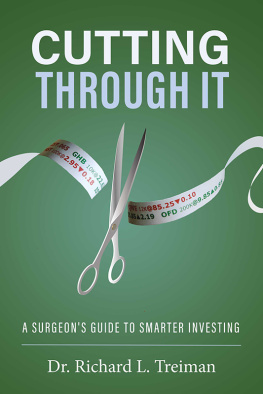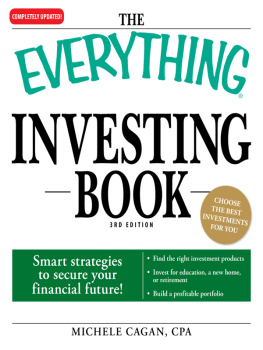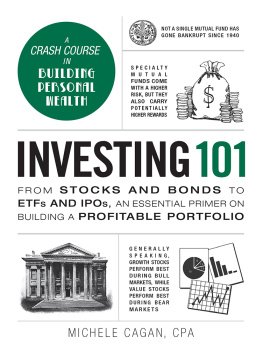Contents
Guide
Stock Market 101
From Bull and Bear Markets to Dividends, Shares, and MarginsYour Essential Guide to the Stock Market
Michele Cagan, CPA

Avon, Massachusetts
Copyright 2016 Simon and Schuster
All rights reserved.
This book, or parts thereof, may not be reproduced in any form without permission from the publisher; exceptions are made for brief excerpts used in published reviews.
Published by
Adams Media, an imprint of Simon & Schuster, Inc.
57 Littlefield Street, Avon, MA 02322. U.S.A.
www.adamsmedia.com
Contains material adapted from The Everything Investing Book, 3rd Edition by Michele Cagan, CPA, copyright 2009, 2005, 1999 Simon and Schuster, ISBN 10: 1-59869-829-X, ISBN 13: 978-1-59869-829-9.
ISBN 10: 1-4405-9919-X
ISBN 13: 978-1-4405-9919-4
eISBN 10: 1-4405-9920-3
eISBN 13: 978-1-4405-9920-0
Cover design by Alexandra Artiano.
Cover images Clipart.com; iStockPhoto.com/traveler1116; Aleksei Oslopov; Classix; duncan1890.
Introduction
From the outside, the stock market seems to be a chaotic stew of mysterious numbers and larger-than-life personalities, a place where billions of dollars trade hands every day. But look a little closer, and youll see the personal tales of triumph and failure, murder and suicide, fortunes won and lost. Throughout the markets storied history youll find investors who made billions of dollars and investors who lost everything.
The stock market has been home to corporate scandals spurred by tremendous greed, scams and schemes, and insider trading. But it is also the place where dreams can come true, where a small start-up can experience a meteoric rise toward blue chip fame.
Armed with the right knowledge, any investor can profit in the stock market, and learn how to protect himself from unscrupulous con artists and deceitful brokers.
The Stock Market
Where Fortunes Are Won and Lost Every Day
Its where fortunes are won and lost, where anyone has a chance to strike it rich or lose everything: The stock market fuels dreams of building great wealth, but can turn suddenly, crushing those hopes and decimating nest eggs.
From the opening bell at 9:30 A.M. Eastern Standard Time to the markets close at 4:00 P.M. , the U.S. stock markets never stop moving. The action, though, is nearly silent, a stark contrast to the Wild West excitement that characterized the markets as recently as ten years ago. Today, the quiet hum of computer screens has replaced the cacophony of shouting traders and the flurry of paper littering the floor.
The U.S. Market Is Born
When the United States was in its infancy, the founding fathers worked tirelessly to create a nation like no other. In a brilliant move, President George Washington installed Alexander Hamilton as the first Secretary of the Treasury in 1789. Under his watch, the U.S. stock market was born. Hamilton founded the countrys first stock exchange in Philadelphia in 1790, followed shortly after by the New York Stock Exchange in 1792, where the Bank of New York was the first corporate stock traded.
Alexander Hamilton (17551804), as seen on the face of the $10 bill. George Washington installed Alexander Hamilton as the first Secretary of the Treasury in 1789. Under his watch, the U.S. stock market was born.
Photo Credit: 123rf.com
A Real Wall
Wall Street came by its name honestly: In 1685, it was positioned behind a twelve-foot stockade wall designed to protect the local Dutch settlers from the dangers of Native American and British attacks.
The markets that now make up what is commonly known as the U.S. stock market are the New York Stock Exchange (NYSE) and the National Association of Securities Dealers Automated Quotations (NASDAQ). Other cities like Boston, Chicago, Philadelphia, Denver, San Francisco, and Los Angeles have exchanges, as do many major international cities like London and Tokyo.
Though the United States still lays claim to the largest stock market in the world, emerging markets around the globe are rapidly adding to the number of publicly traded companies. All around the world, more than 600,000 companies are publicly traded, with billions of shares changing hands every day. By understanding how the different stock markets work and compete for your investment dollars, youll be better equipped to succeed in the investing world.
Competition, both domestic and global, continues to make stock transactions more transparent and more accessible to all investors.
Back in the 1990s, it became clear that individual investors were becoming serious players in the world of Wall Street. With the advent of online investing and an aggressive play for smaller investors by the two leading stock markets in the United States, the NYSE and the NASDAQ, buying and selling investments has gotten easier and much less expensive.
Greed... Is Good
Hollywood loves to stoke stock market drama, often portraying investment bankers and stockbrokers as cutthroat manipulators. One of the most quoted is Gordon Gekko from the movie Wall Street, famous for his core belief: Greed, for lack of a better term, is good. Greed is right. Greed works.
When people talk about Wall Street or The Market, theyre generally referring to the secondary trading market, where the vast majority of investors buy and sell stock. But the primary market is where it all begins. The main difference between these two markets are the players involved: In the primary market, large investors are buying shares of stock directly from the issuing company; in the secondary market, investors buy and sell shares from each other.
Primary Market
When a privately owned company wants to raise a lot of money, the kind of funding required to help the company grow to its full potential, its owners may turn to an investment banker. Unlike brokers who help facilitate trades on the secondary market, investment bankers guide companies down Wall Street, helping them turn privately owned businesses into publicly traded companies.
This primary market is where stocks are actually created and soldwhich is called floatedto the public for the first time. The first sale of stock by a company to the public is an initial public offering, or IPO. And though technically these IPO shares are sold to the public, its not to the general public; rather, these shares are mainly sold to large institutional investors that have the kind of capital the issuing company is trying to raise.
Secondary Market
Everyday trading takes place on the secondary market, what people think of as the stock market. These trades take place on the major stock exchanges all around the world, such as the NYSE, the NASDAQ, and the London Stock Exchange (LSE).
Here, in the secondary market, trades take place between investors, without the involvement of the issuing companies. For example, if you buy shares in Coca-Cola, youre purchasing those shares from another investor; the Coca-Cola Company itself is not directly involved in the transaction.
Ticker Trivia
When a company purchases its own shares on the secondary market, its called a stock buyback.
Why Stocks Make Sense
Though stocks are often perceived as risky investments, over time theyve performed better than any other type of security, even better than gold. Over the course of more than 200 years (from 18022002), stocks have returned an average 6.6% annually, while bonds have returned 3.60%, and gold only 0.7%. Whats more, this is true the whole world over, not just in the United States. For long-term real returns, you really cant beat the stock market.













